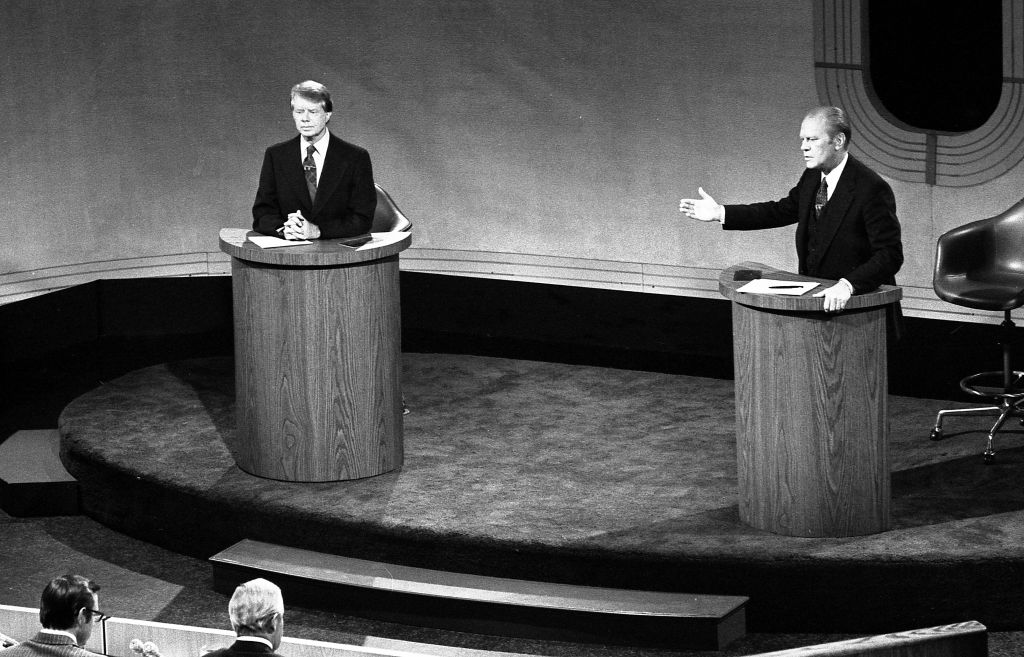The convergence of Tuesday night’s broadcast interruption during the first game of the World Series – caused by an electronics failure and power outage — and Wednesday night’s Republican presidential debate brings to mind one of the most memorable TV snafus in history: the 27-minute loss of audio during the first presidential debate between incumbent Republican President Gerald Ford and Democratic challenger Jimmy Carter.

Governor Jimmy Carter and President Gerald Ford that fateful night in Philadelphia, September 23, 1976. (Wikicommons)
I was there in Philadelphia that night, September 23, 1976, working as the publicist for what then was called The MacNeil/Lehrer Report, now the PBS Newshour (in those days, I also was the publicist for Bill Moyers Journal).
Robert MacNeil and Jim Lehrer were broadcasting special coverage of the debate from the studio of Philadelphia’s public television station WHYY (“Wider Horizons for You and Yours”), a space that was the original home of Dick Clark and American Bandstand during the fifties and early sixties. I shuttled back and forth between the station and the Walnut Street Theatre where the actual debate was being held – a space in the basement had been reserved for the national press corps and I was busy handing out news releases touting the MacNeil/Lehrer coverage, which would feature the first instant poll of how the candidates had performed that night. Although now a thread-worn feature of all debate coverage, our survey was a newfangled notion back then.
This was the first time presidential debates between the two major parties had been held since the famous Kennedy-Nixon confrontations of 1960. In the election years since, either one or both of the party candidates had refused to participate, or equal time rules for third-party and independent candidates had been a problem. But as the front page of the September 3, 1976, edition of The New York Times reported, the FCC had decided “to allow stations to carry debates without having to offer equal time to candidates who were excluded so long as the stations broadcast the debates in their entirety and took no part in organizing them.”
Which is where the League of Women Voters came in. The non-partisan, non-profit, good government group became the official organizer of the ’76 debates and the networks were invited to carry their coverage. That’s how the equal time rules were circumvented, although there were legal challenges almost to the last minute.
The league’s producer was a public television executive named Jim Karayn and their TV director was Jack Sameth, who also had worked as a director and executive producer for Bill Moyers. Because I knew both of them, I had free rein to scoot in and out of the theater without interference from the Secret Service or other security. Simpler times.
Interest was high that night but the big event failed to deliver any drama until a little more than an hour into the debate when the sound suddenly disappeared just minutes before the conclusion. Informed that the nation wasn’t hearing what they had to say, the two men stopped and awkwardly stood behind their podiums, not uttering a word.
I had to get back to the studio and by the time I arrived, the audio still was out and would continue that way for nearly half an hour. MacNeil and Lehrer bravely soldiered on and vamped their way through the long minutes. A sign language interpreter was signing everything they had to say although because she was superimposed against the TV image of a mute Carter and Ford, it seemed more than a little odd.
Years later, Carter told Jim Lehrer, “I watched that tape afterwards and it was embarrassing to me that both President Ford and I stood there almost like robots. We didn’t move around, we didn’t walk over and shake hands with each other. We just stood there.” Ford added, “I suspect both of us would have liked to sit down and relax while the technicians were fixing the system, but I think both of us were hesitant to make any gesture that might look like we weren’t physically or mentally able to handle a problem like this.”
Ultimately, sound was restored although many have subsequently claimed that those 27 minutes were the finest in the history of presidential debates. Journalist Sander Vanocur later described the incident as “an unnatural act between two consenting candidates.”
And the cause of the screw-up? The failure of a tiny, electrolytic capacitor in the amplifier system that costs about twenty-five cents to a dollar.
Two more Carter-Ford debates would follow. In the second, President Ford would prematurely liberate Poland from the Soviet Union, and in the third, Jimmy Carter would discuss the lust in his heart he had revealed during a Playboy magazine interview.
But at that first big showdown nearly 40 years ago, the headlines were made by the simple sounds of silence.



